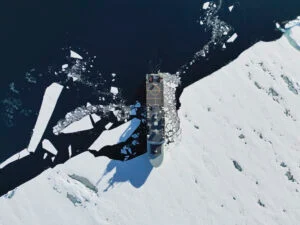
People & Culture
On thin ice: Who “owns” the Arctic?
As the climate heats up, so do talks over land ownership in the Arctic. What does Canadian Arctic Sovereignty look like as the ice melts?
- 4353 words
- 18 minutes
History
A century ago, a strange drama played out on Wrangel Island in the Russian Arctic. The hero of this tale? A 23-year-old Inuit woman named Ada Blackjack
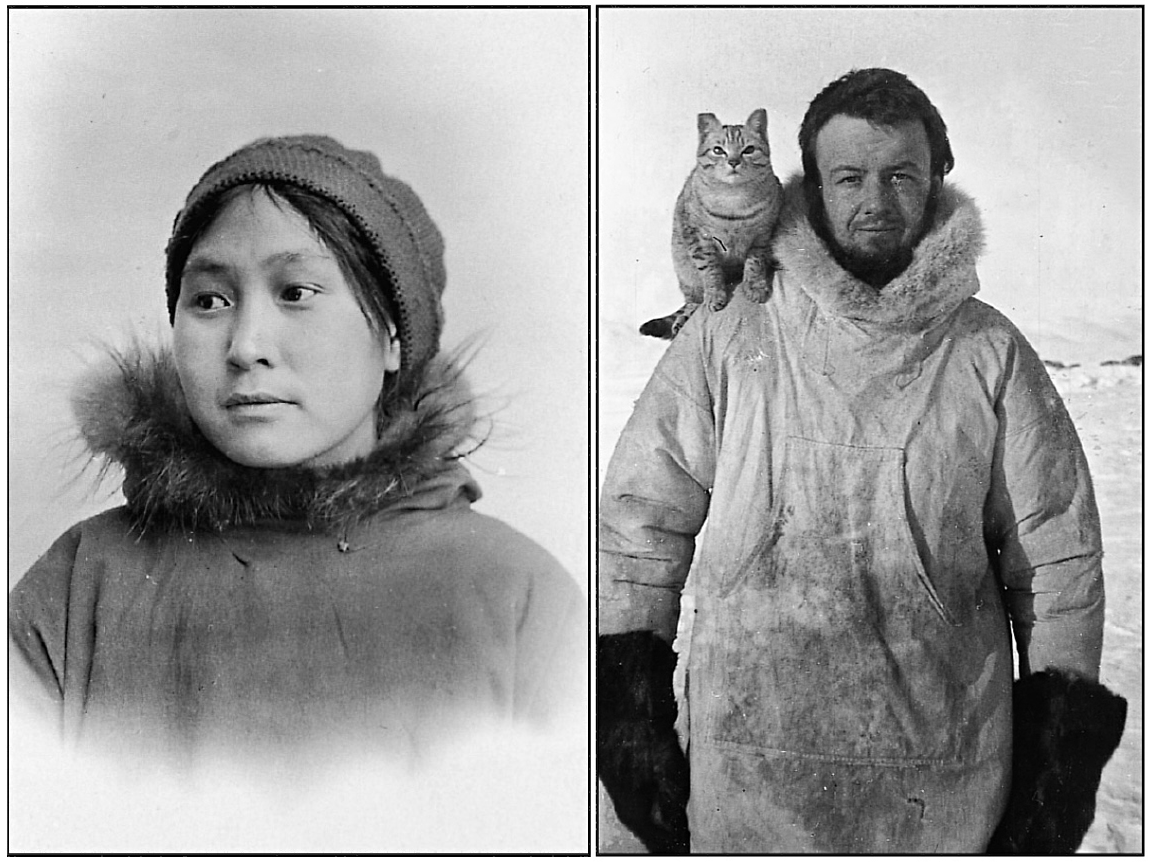
Canada does not exactly have a reputation for conquest, so some may be shocked to learn that 101 years ago, Canada invaded Russia. The instigator of this misguided attempt to claim a new Arctic island for Canada was our country’s most famous explorer, Vilhjalmur Stefansson. The hero and only survivor of the expedition was a 23-year-old Inuit woman, Ada Blackjack. The strange drama ended with four dead and the guns of the Soviet warship Red October aimed at the island.
The early expeditions of Vilhjalmur Stefansson suggested he might become the most interesting, original, and successful of Arctic explorers, although even as an anthropology student at Harvard University, he showed hints of the humbug that would dog his later life. Born William Stevenson in Arnes, Manitoba, he changed his name at the university to the almost unspellable Vilhjalmur Stefansson in order to give himself some faux-Viking street cred.
Stefansson travelled extensively through the largely uncharted wilderness of the eastern Arctic from 1906 to 1912. Unlike the British and American explorers who had preceded him, Stefansson totally adopted the customs of the Inuit. He learned from them, dressed like them, ate like them, hunted, and travelled as they did. He learned Inuktitut, respected their customs, and, when he returned to the south, spoke and wrote about them in glowing terms. He promoted the north as “the friendly Arctic,” a place, he claimed, where “a family could live … as comfortably as they could in Hawaii.”
The public, the press, other explorers, and the Canadian government all responded positively to Stefansson, but he did himself no good when, in 1913, he began advancing theories and hypotheses that he had little evidence to support. Most suspicious was his bold claim that he had found a new race of people in the high Arctic that he called the “Blond Eskimos.” Further, he declared his belief that these people were descendants either of the Vikings led by Leif Erikson, or of survivors of the infamous Sir John Franklin expedition. The subsequent controversy led to mockery. Roald Amundsen, the most successful of all polar explorers, derisively dismissed Stefansson as “the greatest humbug alive.”
It was the disastrous Canadian Arctic Expedition of 1913-1916 that truly damaged Stefansson’s reputation. The expedition was a major event involving three large ships, a large crew, and funding from the Canadian government. Stefansson, leader of the expedition, abandoned the main ship, the Karluk, when it became marooned in the ice. His claim was that he was going to hunt for food, but he was gone for weeks. By the time he returned, the ship had drifted far to the west and been crushed by the ice.
The survivors of the disaster eventually made it to Wrangel Island, a large uninhabited Russian island north of Siberia. The captain of the Karluk, famed Newfoundland seaman Bob Bartlett, crossed over both the island and the ice to seek help in Siberia. He eventually returned by ship to pick up the few survivors of the shipwreck.
Considering how badly the expedition had turned out, it was remarkable that Stefansson even considered sending another group of adventurers to the north, let alone that he succeeded in doing so. However, after several years of highly successful lecturing on the Chautauqua circuit about the wonders of the ‘friendly Arctic,’ and becoming president of the Explorers Club, he came up with a bold new scheme to buff the reputation of the Dominion of Canada — and himself. His plan was to send a group of young explorers back to Wrangel Island to plant the flag and claim it for Canada. He began recruiting and found three enthusiastic volunteers — two of whom were veterans of the Karluk debacle. Unfortunately, all three were of the wrong nationality — all were American. Stefansson needed a bona fide Canadian to lead the expedition. He appealed to the president of the University of Toronto to ask if there were any likely candidates with good health, a strong disposition, and some scientific training. The president, Sir Robert Falconer, proposed a recent graduate, the son of a U of T professor, Allan Crawford.
With his small team mostly assembled, Stefansson appealed to the Canadian government for support and financing. Stefansson’s argument was that making Wrangel Island Canadian would not only be a feather in the cap of the young country but would be a practical addition to the Dominion: potential site of an airstrip for trans-Arctic aviation, a weather station, and a site for reindeer breeding, walrus hunting, and fur trapping.

At first, the Canadian government turned him down. Stefansson went ahead anyway, convinced he could eventually get the government on board, and if not, perhaps sell the idea to either Washington or London. Instead of paying the young adventurers, he convinced them to buy stock in the new company he set up for the expedition. Combining that with some private investment and a little of his own money, he sent the four men to Nome, Alaska, with enough cash to purchase 2,200 kilograms of food, guns, tents, equipment, and clothing to last them a year in the Arctic. He recommended against taking much meat, as he was convinced they would be able to hunt for all they needed. He also recommended against buying much winter clothing. Instead, he wanted them to take some Inuit with them, especially Inuit women, who could sew them winter pants and parkas from the sealskins and bearskins they would harvest. He instructed them to put the word out for suitable interested parties.
Some Inuit expressed interest, but as they sized up the inexperience of the young explorers and the reputation of inhospitable Wrangel Island, they all dropped out. There was only one Inuk willing to join, and she was herself very reluctant. Ada Blackjack was 23. She had been abandoned by an abusive husband, and she needed the money. The $50 a month being offered was more than she had ever seen in her life. On the other hand, she would be away from her young son who was suffering from tuberculosis, she was nervous about travelling with four strange men, and she was deathly afraid of polar bears. However, she had a reputation in Nome, quite possibly undeserved, for both drinking and prostitution. In the end the local police chief, wanting her out of town, basically coerced her into accompanying the men as their seamstress (at which she excelled) and cook. She consulted with a shaman, who told her that he felt the expedition was doomed, but she felt trapped — she had committed to Crawford and the police chief that she would go. Now she had to.
On September 9, 1921, the five left, sailing north. The next day they landed briefly in Russia, and although they didn’t tell the Russian authorities the true nature of their mission, they did tell them they were headed for Wrangel Island. The Russians made it clear to them that Wrangel was Russian territory, but merely laughed at their intention to go ashore, a plan they felt was physically impossible.
Five days later, with some difficulty, the group made it to Wrangel, and made it onshore. Virtually the first thing they did was raise the Union Jack, claiming the island for King George, the British Empire, and the Dominion of Canada. The American ship that had taken them there returned to Nome, and the news got out. Soon Canada had not one, but two, infuriated neighbours — the United States, and the Soviet Union.
On Wrangel, the team of land-claiming explorers began to settle in. The Arctic winter would soon be upon them and they had a lot to do. None had any real experience in this sort of wilderness homesteading, but they did the best they could. Ada, though, began to act in an unexpected manner, exhibiting a very pronounced crush on Allan Crawford. The Toronto grad student was both the leader and the best looking of the four men, and although he was mortified by the attention, it was clear to all that Ada was utterly infatuated. “Oh, Crawford,” she purred. “Oh, your beautiful green eyes.”
The group began to fall apart. Ada, homesick and anxious, drove the men crazy, and in turn they treated her horribly — refusing to feed her, forcing her to sleep outside on the ground, threatening to dog-whip her.
Meanwhile the controversy about the expedition continued to swirl through London, Washington, and Ottawa, and Stefansson continued to stoke it to promote his grand plans to colonize the island. The British wanted nothing to do with this harebrained scheme and so for once left the decision-making to the colonials on the Rideau. The American State Department pronounced that “Wrangel Island, claimed by the explorer Stefansson for Canada, is in reality the property of Russia,” and further stated that in its opinion, the remote no-man’s land was of no real value to any country.
Stefansson had his best luck in Ottawa. He appealed by letter to the new Prime Minister, Mackenzie King, who put the subject to discussion in the House of Commons, and declared, “The Government certainly maintains the position that Wrangel Island is part of the property of this country.” Stefansson took this as a win. He was convinced that Canada would soon financially support his expedition, and he was glad, knowing that he would face big costs when it came time to extricate his explorers from Wrangel Island.
The five survived their first winter on the island. They endured temperatures as low as -47 C, they had a very close call with an attacking polar bear, and their food supplies began to dwindle. But at least Ada’s unrequited love affair with Crawford subsided. She worked hard at sewing sealskin parkas, and relations between them all began to improve. The five looked forward to the summer, when they expected a relief ship to bring Stefansson, more colonists, and supplies for their new piece of Canada.
It would not be that simple. Stefansson could not find the money to finance a relief ship, let alone a continuation of the Canuck occupation of Wrangel Island. Eventually, he received $3,000 (equivalent to about $42,000 today) from his friend, the famous aviator Orville Wright, and another $3,000 from the parsimonious Canadian government, who finally made a financial commitment to the grand expedition. It was not enough but it would have to do.
The increasingly desperate team on Wrangel peered out to sea, searching for a rescue ship. With the short Arctic summer nearly over, Stefansson finally hired Captain Joe Bernard, a skipper with a schooner in Nome who was willing to try to make it to the island. The Teddy Bear left Nome on August 20, 1922 but once it made it into the Russian Arctic it soon encountered pack ice. Skipper Bernard repeatedly rammed his wooden ship into the pack ice, but eventually, in late September, bitterly disappointed that he couldn’t provide help to the young occupiers, he turned around and returned to Nome.
Stefansson blithely told the press, public, and parents of the Wrangel team that there was nothing to worry about. He was sure that his protégés would make it though a second winter, and he would send another mission to retrieve them the following summer. On Wrangel, the five were not so optimistic. Once it became obvious that help was not going to arrive, they began to wonder if they should attempt an overland escape to Siberia. There was not enough food for them all to last through another winter.
They had to wait through the long autumn for the sea ice to harden and thicken enough to take the weight of their heavy sledge. Crawford and one companion, Lorne Knight, would try to make the dangerous journey. Knowing there was considerable risk he might die, Crawford prepared a will, creating a trust to give an annual award at U.T.S. — the private school he had attended that is attached to the University of Toronto. The Allan Crawford Prize in Chemistry and Physics is still awarded there today.
On January 7, 1923, he and Knight, plus five dogs, set out. The mission quickly turned bad. After a year of malnutrition, neither of them nor the dogs had the energy needed to pull their 300-kilogram sled across the Arctic, through the darkest days of winter. Both men suffered from frostbite and scurvy, and after 13 days they gave up and returned to camp.
With Knight now virtually an invalid, Crawford decided he would make a second attempt to cross to Siberia with the two other men, leaving Knight in the care of Ada Blackjack. As the temperature fell to a staggering -56 C, Ada prepared what food she could for the men to take on the second sledding mission.
While Stefansson was in New York announcing his retirement from exploration, and in Moscow the Kremlin was formally making an international complaint that the interlopers were trespassing on Soviet soil, the party of three explorers left Knight and Ada behind and headed south to try to cross to Siberia. It was the last time the three would ever be seen. They may have gone through the ice into the Arctic sea; they may have frozen to death, or they may have been eaten by polar bears. No trace of them has ever been found.
If Ada and Knight were to survive, it was now all up to her. Knight was not just ill. He was dying. Unable to rise from his bed, he could not trap or hunt, he could not aim a gun to protect them from bears, and he could not even really think straight. Ada became a nursemaid to the increasingly abusive and incontinent Knight. Terrified of guns, she willed herself to learn how to use a rifle to shoot birds, a fox, seal or nanook to keep herself and her sick companion alive.
Back in Ottawa, Stefansson was having a hard time. Though now officially retired from exploring, he still felt it his obligation to try to raise the money to retrieve the party (that at this point he still assumed consisted of five members) from Wrangel. In fact, it was now a party of one.
Try as she might, Ada was not able to keep Lorne Knight from sinking into utter lethargy and despair. On June 23, she was unable to wake him. He was dead.
Ada was now the sole survivor of the ill-fated expedition. For her whole life, until this moment, she had been somewhat dependent on others to make decisions for her. She was now totally on her own — probably the only person for hundreds of kilometres in any direction.
Stefansson raised a relatively small amount of money, but just enough to send another young adventurer, Harold Noice, back to Nome to make another rescue run for Wrangel Island. Stefansson did not have enough money to allow Noice to charter another ship for the voyage. Noice became increasingly frustrated with Stefansson as the short summer sailing window again began to slip away.
As Ada, from the new lookout tower she had built, scanned the horizon for rescue, there were new complications from Moscow and London. Lenin’s government announced that it would be sending a warship from Vladivostok to take back possession of the island in the name of Russia, and arrest and jail all those on it. In return, the British government responded by saying that the capture of Allan Crawford and his companions would be looked upon as the “equivalent to an act of war.”
The sabre-rattling helped Stefansson’s cause, and at the eleventh hour he managed to raise the money Noice needed, in part from donations from some private British citizens, including the granddaughter of Sir John Franklin, and in part by selling the newspaper rights to the story to the Toronto Star.
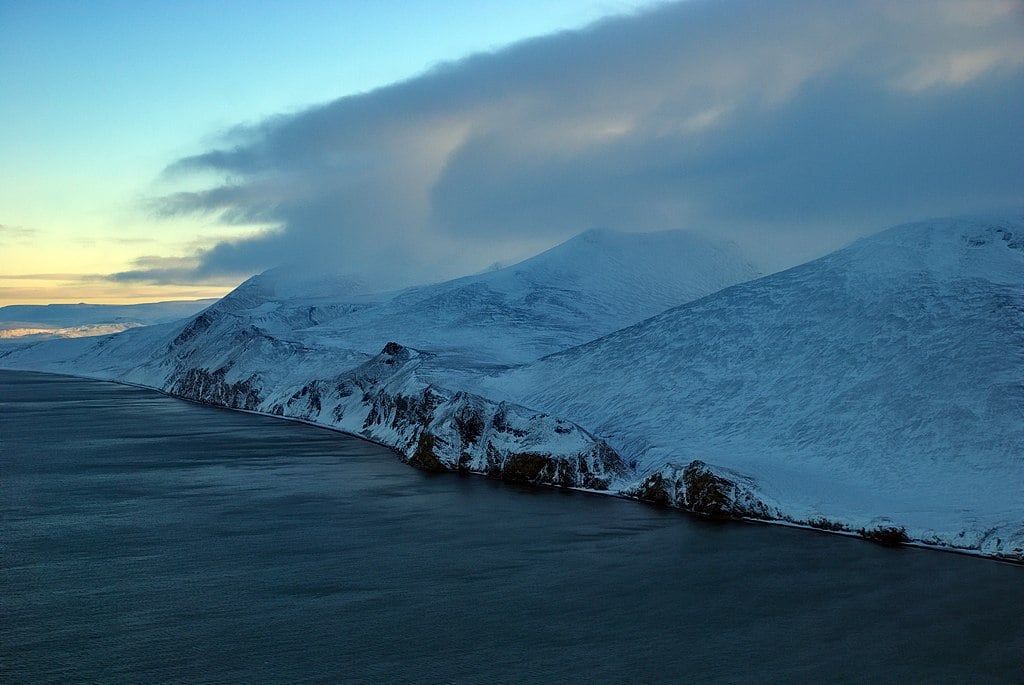
On August 2, Noice was finally able to depart from Nome, taking with him a dozen Inuit and a single white adventurer who he had convinced to take over the occupation of Wrangel Island. He had the usual problems with engine failure, ice, fog and ship damage, but at least, he felt, he would have lots to write about in the articles for the Toronto Star.
Eighteen days later, on August 20, Ada heard a noise she at first took to be a herd of walruses, but soon realized was the rumble of a ship’s engine. She ran to her lookout tower, then to the beach, where she saw through the fog the masts of an anchored ship, then was met by Harold Noice, wading ashore. She was overcome with gratitude, but mystified that Crawford wasn’t with the man. He too was confused that Crawford and the others weren’t with her. Both realized together that Crawford and his companions must have died, that she was the sole survivor of Stefansson’s grand expedition.
Noice left the new party of 13 and supplies for another winter on the desolate island and took Ada back to Nome. There, shamefully, she had to undergo cross examination by the authorities who accused her of killing Knight, or at least not doing what she could to prevent his death. Noice literally stole her diary of her time on Wrangel, and also took off with Knight’s diary. He and Stefansson spent much of the next few years fighting over the publication rights to the story, with Stefansson at one point threatening to have his lieutenant blackballed from the Explorers Club over the matter.
To pay off the many bills that had accrued from the expedition and the efforts to relieve it, Stefansson offered to sell Wrangel Island, first to Canada for $30,000, then, after they ignored the offer, for the bargain price of $27,000 to the United States. Of course, it was absurd. Stefansson no more owned Wrangel Island than he owned the Rideau Canal or the Brooklyn Bridge.
Remarkably, though, Stefansson did find buyers — two brothers named Carl and Ralph Loman, who purchased the ‘title’ to Wrangel, in return for an agreement to pick up the new colonists Noice had left on the island. The Lomans attempted to do this the following summer but were again thwarted by the icepack. It took the Soviet warship Red October to smash through the ice, arrest the North American intruders, tear down the Canadian Red Ensign, and replace it with the hammer and sickle of the U.S.S.R. The ship returned to Vladivostok and the would-be colonists were jailed first in Siberia and then in China. The sole American died in custody; the Inuit were eventually shipped home by the Red Cross.
There are no winners in this loony story. After being widely condemned for what Saturday Night magazine called, “the tragic folly of the whole enterprise,” Stefansson did eventually patch his reputation back together and in 1937 was once again elected president of the Explorers Club. Ada was acclaimed as “the female Robinson Crusoe” and, by the Toronto Mail & Empire, as “the first Eskimo heroine in history,” but she was always very uncomfortable about the media circus that surrounded her. She drifted through a long life, mostly in the Pacific Northwest and Alaska. Stefansson promised her a share of the royalties of his book The Adventure of Wrangel Island, but it was not a big seller and he never paid her. She did outlive him. Stefansson died in 1962. Ada Blackjack died, aged 85, in Palmer, Alaska in 1983.
Are you passionate about Canadian geography?
You can support Canadian Geographic in 3 ways:

People & Culture
As the climate heats up, so do talks over land ownership in the Arctic. What does Canadian Arctic Sovereignty look like as the ice melts?
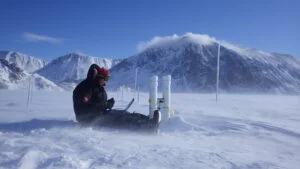
Science & Tech
Celebrating Canadian Innovation Week 2023 by spotlighting the people and organizations designing a better future
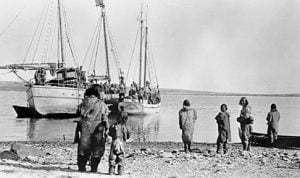
Exploration
A century after the start of the thrilling expedition that strengthened claims to Canadian sovereignty in the Arctic, the first Canadian Arctic Expedition remains a largely unknown part of the country’s history

Environment
The Royal Norwegian Embassy and the Royal Canadian Geographical Society teamed up for two days of talks on the future of the Arctic and the “blue economy” in Norway and Canada